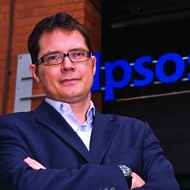FEATURE26 June 2013
All MRS websites use cookies to help us improve our services. Any data collected is anonymised. If you continue using this site without accepting cookies you may experience some performance issues. Read about our cookies here.
FEATURE26 June 2013
“If there is a lesson to be learned… it is that a merger like that of Ipsos and Synovate takes time, even if its physical and formal execution is swift,” said global CEO Didier Truchot.

Then came the hard part. While most acquisitions are a good idea in theory, they rarely achieve all that they are meant to in practice. The problem comes in the integration. Business academics are split on whether mergers, on balance, destroy more value than they create.
“We have much better geographic coverage around the world and we have all the best people from Synovate and Ipsos now. But getting all those benefits visible to clients is an ongoing process… so we’ll see how we go”

Ben Page
For Ipsos and Synovate, the integration process is now complete. “Last year was a year of consolidation,” says Ben Page, CEO of Ipsos Mori, the UK arm of the Ipsos group. But has that consolidation created value or destroyed it? Page, who describes himself as a historian, says it’s “too soon to tell”.
The signs are positive though. “We have much better geographic coverage around the world and we have all the best people from Synovate and Ipsos now,” says Page. “But getting all those benefits visible to clients is an ongoing process… so we’ll see how we go.”
2012 was a flat year for Ipsos. Revenues of €1.79bn were the same as the pro forma figures for Ipsos and Synovate the year before. Global CEO Didier Truchot admitted that 2012 was “not an easy year”. The company lost market share, either from exiting certain activities or lost client contracts. Major client relationships held firm, and in many cases actually grew. But, all said, Ipsos was over-optimistic in its growth expectations, said Truchot.
“If there is a lesson to be learned from this error in our forecasts, it is that a merger like that of Ipsos and Synovate takes time, even if its physical and formal execution is swift,” said Truchot. “Time to reassure clients, and time for researchers and other staff to feel comfortable enough to collaborate between themselves, and therefore fully available to seize the opportunities that any market – even a lacklustre market – offers to the most enterprising.”
Quick decisions
The swiftness of the merger was deliberate, says Page. “What we tried to do was learn from other companies in the industry who had spent a long time integrating their businesses, leaving them in their separate entities and then moving them around with various amounts of grief and wailing and gnashing of teeth. So what we did was a very fast integration. We completed the deal on the 12 October and by the 1 January 2012 we were absolutely clear about where everyone would be sitting.”
For Paul Stamper, now Ipsos Mori’s head of qual, the speed of the integration was like nothing he’d seen before. He was watching the process from the Synovate side of the fence, but prior to joining Synovate he was a long-time TNS executive. While there, he had gone through three other major merger processes, including the sale of TNS to WPP’s Kantar Group.
“The more uncertainty there is, the more people worry about whether they are going to have a job next month – and in an organisation that functions because your people are client-facing, you want to have as little of that as possible”

Paul Stamper
The swiftness of the integration helped deal with a lot of the personal anxiety that tends to accompany acquisitions and mergers, says Stamper. “The more uncertainty there is, the more people worry about whether they are going to have a job next month – and in an organisation that functions because your people are client-facing, you want to have as little of that as possible.”
Of course, within Synovate there was “a certain amount of shock” that greeted the news that the company was being groomed for sale. “Immediately everybody started Googling their counterparts on the other side to see what their profile looked like. There was a lot of Linkedin curation going on.
“But from the announcement that something was due to happen and it becoming a reality, it happened extremely quickly. And – apart from the natural disruption that comes with something like this – from an employee point of view, I think it was handled pretty well. I didn’t get a sense of people being left in the dark, of them being dumped on, of having things done to them.”
Page, too, had gone through a merger process before, when Ipsos bought Mori for £88m in 2005. “It was a good rehearsal for us,” he says. “It made us aware of the need to have as much clarity as possible.
“If you’ve got two qual units or two FMCG units, or whatever, you don’t want these people festering and worrying about who is going to come out on top. You’ve got to have clarity about that, and you don’t want two senior people running two qual teams. They’ve got to come together at some point so why leave them carrying on with separate cultures? You’ve got to get them together.”
Page is adamant that a quick integration “was the right thing to do”, although in certain instances, he says, people found themselves doing roles that weren’t right for them in hindsight. “But the physical integration was only one part of the process,” he says. “You can move the chairs relatively easily, but it’s moving people’s minds and getting them to be a single team that takes time.”
Joined-up thinking
Part and parcel of getting two companies to act as a single team is to align them around a common suite of products and solutions. Different companies have different approaches to solving client problems, but “you want to try and choose the best bits of the two,” says Page.
“[Former Synovate CEO] Adrian Chedore talked about not losing Synovate’s ‘golden nuggets’ and he was right. So we’ve got the golden nuggets like Censydium, but we’ve re-engineered a whole load of products and approaches using the best of both companies – and that takes a long time; six months in some cases.”
Censydiam is a good example of this process of product integration, Stamper says. “The core of Censydiam is a very powerful tool; the model is very effective and works well. But there were also really powerful pieces of Ipsos IP that were doing some of the same things, but doing it from a different point of view; starting at a different methodological perspective – a different statistical assumption, if you will. The challenge was to find ways of integrating the best thinking of both parts, so you are communicating a solution that has a coherence methodologically, but allows you to do all the things that the various components are designed to do.”
This product review process came at the right time, says Page. “We’re at a point of inflection now where the industry is faced with DIY at one end, plus the continued squeeze on marketing budgets and clients wanting better ROI for their spend. We’ve taken advantage of the fact that we needed to look at everything anyway, as part of our integration, to review some of these things in light of some of the changes in the industry, and the demands for faster, cheaper, shorter, quicker. We’ve tried to reflect all of that.”
Growth plan
The success of the merger, and all the integration work, will ultimately be measured months and years down the line. “Our results last year showed it was a tough year,” says Page. “But undoubtedly we spent a lot of time on internal issues, because you have to work things through. Even with the best will in the world you’re spending more time in meetings discussing internal things than you would like to, rather than being out there with clients.”
Getting back out there, then, is the priority for 2013 and years that follow, says Page. “Now everybody is completely settled, and we’ve gone through everything and chosen our solutions, it’s about being entirely focused on what clients need.”
But if dealing with a merger wasn’t hard enough, Ipsos and the research industry as a whole, has a lacklustre economy to contend with. “The challenge for researchers in this market is that we all have to be much hungrier,” says Page. “Nobody gets breakfast unless they take it off a competitor these days.”
Editor’s note: The interviews on which this article is based were conducted in April
18 Comments
Anon
11 years ago
What else does one expect the senior leadership to say? I would urge any ex Ipsos/Synovate researchers to come forward and balance out this party-line point of view. Am I alone in thinking it created a huge amount of disruption and a haemorrhaging of senior staff?
Like Reply Report
Brian Tarran
11 years ago
In the company's annual results, there is a reference to staff departures: "Finally, staff departures were seen in Asia and the US in particular, sometimes as a result of targeted approaches by direct rivals, making it impossible to hold on to all of the contracts for which these staff were responsible."
Like Reply Report
NickD
11 years ago
"Adrian Chedore talked about not losing Synovate’s ‘golden nuggets’" And that's the shame of it - Synovate before the merger was a genuinely insightful and innovative research company. In becoming part of the sprawling Ipsos empire, it lost that edge. It's good to at least see leadership at Ipsos admitting that they were chasing revenue (and/ or closing out competition), and that it didn't materialise as they had expected - the research-buying landscape is poorer as a result of the purchase.
Like Reply Report
Anon
11 years ago
I left Ipsos/Synovate because of the acquisition. I do think the senior management did try to reassure, but I'm afraid they were way out of touch with the reality of the deep shop floor insecurity. We were all told that redundancies were inevitable (and they happened across every team) and so most of us left to ensure our mortgages were paid at the end of the month.
Like Reply Report
Anon
11 years ago
I worked for Ipsos in the US as an account person and was let go about a year after the merger ('your position is eliminated' was the official wording). What I saw was clear cutting of long time senior personnel (older, higher cost) from both the Ipsos and Synovate sides, loss of mid-level staff unwilling to contend with the uncertainty and disappointed at the treatment of senior managers, an absolutely absurd and badly timed reorganization of the US staff into 'innovation' and 'market understanding' buckets (thank you McKinsey - why does anyone with half a brain follow their recommendations for a business about which they know nothing) and a total inward focus, at the expense of clients. Ipsos has a track record of buying companies to eliminate competition and then eviscerating them (e.g., 3 years after Ipsos purchased OTX, few OTX services or employees remain). Global coverage has been improved as a result of the merger with Synovate merger, but everything else is less than it had been. Over time, Ipsos may get back to where they were, although after 5 years TNS is still a fraction of the size it was before WPP. However, in the meantime they are still losing employees and clients. There are no winners in this merger so far.
Like Reply Report
Anon
11 years ago
I am more familiar with the RI-TNS merger and wish you had done a piece on that. Hemmorraging would be a good word to use. What I found with WPP was how it offered a parachute to a few politically connected and smarter guys (who joined other units like Kantar or MB). In the case of IPSOS and synovate, at least in Asia there has been significant loss of talent from Synovate's side (some moving to GFK which expanded in Asia). But I need to concede that Ipsos was smart enough to allow and retain senior Synovate staff in some places ... even if it meant letting Ipsos senior staff leave (India for instance, where the Ipsos team was newer and not as experienced and established as Synovate was)
Like Reply Report
Susan
11 years ago
Yes that is a good idea - TNS has been through several mergers. It would be interesting to see how it has performed through MBL-NFO and the latest RI merger. could you do a piece on that please?
Like Reply Report
Anon
11 years ago
I was involved in the TNS and RI merger, it was less of a merger and more of a absorption of RI by TNS. There was huge overlap in leadership roles (as expected) in Europe for instance so there had to be culls in that respect, of all the shared European offices (about 25 I think) only one country retained the RI head, even then in that country the TNS head remained in place to share the role. Have a look at the TNS website now and see if you can find any remnants of RI, a merger it certainly was not. That said I think the management who handled the take over (ironic that WPP buying TNS meant RI was taken effectively taken over) were in a seriously tough situation and I don't think any decisions were taken lightly.
Like Reply Report
Max
11 years ago
Things are not as hunky dory as portrayed. Several people have left from both Ipsos and Synovate. Ipsos is lucky that the current MR job market is at a low ebb, else the employee turnover would be far higher. Two major issues has been Ipsos's very operationally driven structure which is more process focused than solution focused and saps out the morale of employees who are too busy form filling rather than doing something productive for their Clients. The other reason has been its top heaviness and very elaborate global structure which is hugely expensive and quite unproductive in generating incremental business - again the focus is internal e-mailing and meetings rather than Client solutions. I would not be surprised if the senior management at Ipsos actually believes its own rhetoric, as they have completely lost touch with the shop floor.
Like Reply Report
Anon
11 years ago
The challenge is really about acquisitions. If you think about why people start an advertising company or research agency they are motivated by doing great work or highly creative work for clients who they are close to, outside the confines of a corporation. When the company is acquired by a corporation invariably the focus shifts from doing great work or great creative work to meeting financial targets. The agency will now be surrounded by accountants, and HR imposed limitations, and the senior management will get their focus off the great work and on to 'managing the business' and all the tiresome things that entails in a large corporation. The owners having made their money from the transaction can leave and then typically staff turnover starts to increase as the original business now changes beyond recognition. It would be interesting if these recent acquisitions by the multinationals published their before and after financials for the original businesses as well as their staff turnover rates.
Like Reply Report